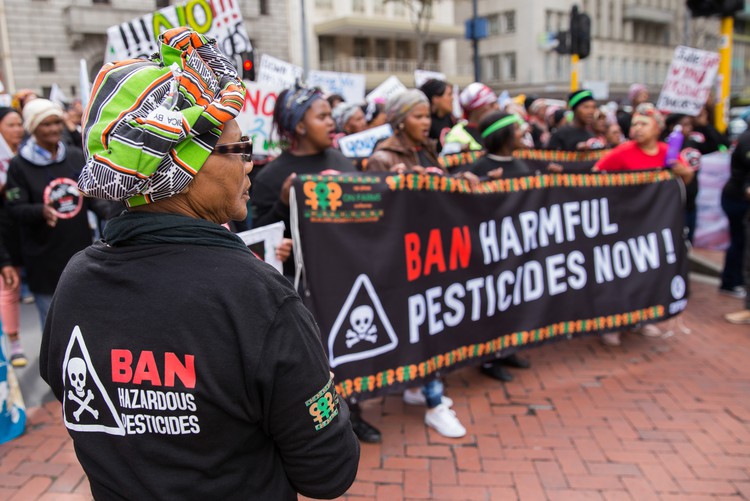Farmworkers want 67 pesticides banned
NGO says the pesticides are already banned in the European Union
Over 200 women farm workers from across the Western Cape marched to Parliament on Wednesday demanding that the Department of Agriculture, Forestry & Fisheries (DAFF) and the Department of Labour work together to ban 67 pesticides to protect the health of farm workers. They also want farmers to be held accountable if they disobey labour practices.
“At the barest minimum, please ban those 67 highly hazardous pesticides that are already banned in the European Union (EU),” said Colette Solomons, the Director of the NGO Women on Farms Project (WFP).
Some of these pesticides include Roundup, Dursban and Paraquat, which has been banned in the EU since 2007. Solomons said that farmworkers are still being forced to use these pesticides and that “the majority of women seasonal workers do not receive protective clothes for these highly hazardous pesticides”.
She said workers staying near the vineyards are also affected as the pesticides drift into peoples homes. Solomons said that if European farmers can find alternatives that are less toxic, our farmers can do the same.
Research done by WFP shows that 73% of women seasonal workers interviewed did not receive protective clothing and 69% came into contact with pesticides within an hour after it has been sprayed. For safety, different pesticides have their own “re-entry period” that has to be adhered to.
Before the march, the farm workers gathered at the Community House in Salt River to share their experiences working with pesticides.
“I was so sick,” said Lia Armoed, a farmworker who is now unemployed. Armoed said she had rashes and breathing problems. When she went to the doctor, she said he took some of her skin for analysis but she never received the results.
Farmworker Gertie Gama said that she is expected to work while pesticides are busy being sprayed. If she complains, she is told to leave.
A video of interviews with workers was screened in the hall. Farmworkers said that pesticides are sprayed 10 metres from where they are working and the wind blows it towards them.
“This is not going to stop if you just rely on one government department,” said David Esau, Provincial Chief Inspector for the Western Cape. He said that one of the proposals he will make is to establish a task team to look into the issue, which will include farmworkers.
After the dialogue, farmworkers marched to Parliament in high spirits, holding placards and singing along the way. Outside Parliament more speeches were made.
A memorandum was handed over to Chief Director of Western Cape operations Mawele Ntamo. He said he would deliver their message to the Minister of Labour.
The WFP campaign to ban pesticides is also being supported by Oxfam South African and Oxfam Germany. With the memorandum, members from Oxfam Germany handed over a placard with 29,302 signatures on it from German consumers supporting the ban. Governmental departments have been given until 30 September to respond.
Pesticides are widely used in the agriculture sector. According to the Regulatory Framework for Pesticides released by DAFF “Pesticides are an indispensable tool to ensure human health, food production, food safety and food security”. The document states that pesticides are needed for food production of the ever growing population. DAFF regulates about 9,000 pesticides.
Next: Tensions flare at Cape housing dialogue
Previous: Police fire rubber bullets, teargas to disperse protesting students
© 2019 GroundUp.
This article is licensed under a Creative Commons Attribution-NoDerivatives 4.0 International License.
You may republish this article, so long as you credit the authors and GroundUp, and do not change the text. Please include a link back to the original article.



